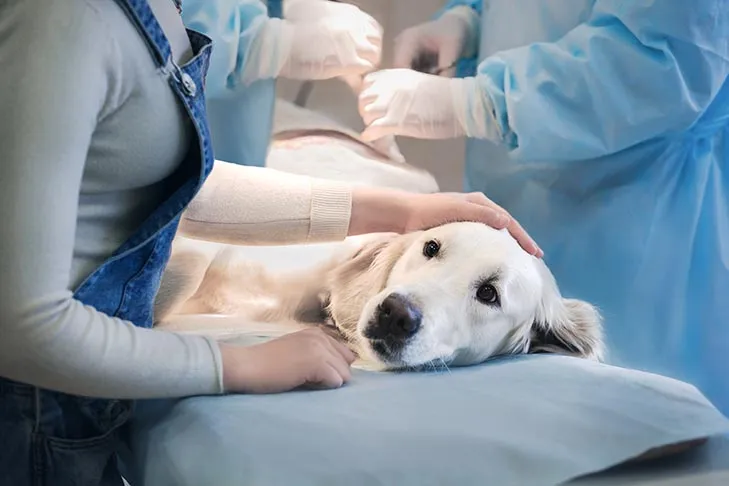Dogs, with their inherent curiosity, often explore the world through their mouths. This can lead to accidental ingestion of harmful substances, even for the most vigilant dog owners. Knowing the signs of poisoning in dogs and understanding the steps to take in such emergencies is crucial. Poisoning is a serious situation requiring immediate veterinary attention. This guide covers the symptoms, treatment options, and preventive measures to protect your canine companion.
Recognizing the Symptoms of Poisoning in Dogs
Poisoning occurs when a dog ingests, inhales, or absorbs a toxic substance. The reaction time and symptoms can vary widely depending on the type of poison and the amount ingested. Some toxins cause immediate reactions, while others may take days for symptoms to manifest. According to Dr. Jerry Klein, DVM, Chief Veterinarian for the American Kennel Club, understanding these variations is key to prompt action.
 Beagle appearing relaxed next to a food bowl filled with dog food.
Beagle appearing relaxed next to a food bowl filled with dog food.
Here are some common symptoms of poisoning in dogs:
- Vomiting: This is often one of the first signs that something is wrong.
- Loss of appetite: A sudden refusal to eat can indicate poisoning.
- Pale or yellowish gums: This suggests internal bleeding or liver damage.
- Excessive thirst or urination: Certain toxins can affect kidney function.
- Diarrhea: Similar to vomiting, this is a common gastrointestinal response to toxins.
- Bloody or discolored stool: This indicates internal bleeding in the digestive tract.
- Bloody urine: This suggests kidney damage or internal bleeding.
- Lethargy or weakness: A sudden decrease in energy levels is a significant warning sign.
- Unsteady gait: This can indicate neurological damage.
- Seizures, tremors, or hyperactivity: These are severe neurological symptoms requiring immediate attention.
Beyond these immediate symptoms, poisoning can lead to long-term health issues. Anemia, caused by toxins damaging red blood cells, can deprive your dog of oxygen. Cardiovascular problems, such as irregular heartbeat, and damage to internal organs are also possible.
What to Do Immediately If You Suspect Your Dog Is Poisoned
Time is of the essence when dealing with poisoning. If you suspect your dog has ingested something toxic, act quickly:
Stay Calm: Your composure will help you think clearly and act effectively.
Remove the Source: Immediately move your dog away from the suspected poison.
Look for Signs: Watch for a combination of gastrointestinal symptoms (vomiting, diarrhea) and neurological signs (tremors, seizures).
Contact Your Veterinarian: Call your vet immediately. Provide a detailed description of your dog’s symptoms, the suspected poison (if known), and the amount ingested.
Emergency Contacts: If your vet is unavailable, contact an emergency veterinary hospital or a pet poison control helpline. Keep these numbers readily accessible:
- The ASPCA Animal Poison Control Center: (888-426-4435) – Available 24/7 (consultation fee applies).
Provide Information: Be ready to provide the following information to the veterinarian or poison control center:
- Your dog’s weight, breed, and age
- The name of the suspected poison
- The amount of poison your dog ingested (if known)
- The time of ingestion
- Any symptoms your dog is exhibiting
Gather Evidence: Collect a sample of the poison, its packaging, or take a photo of the product label. If your dog vomited or had diarrhea, collect a sample for examination. This information will assist the vet in diagnosing and treating your dog.
 A Golden Retriever being comforted by its owner at a veterinarian's office.
A Golden Retriever being comforted by its owner at a veterinarian's office.
Treatment Options for Poisoning in Dogs
The treatment plan will depend on the type of poison ingested, the severity of the symptoms, and your dog’s overall health. Common treatments include:
- Antidotes: Some poisons, such as rodenticides and antifreeze, have specific antidotes. Providing information about the poison helps the vet administer the correct antidote quickly.
- Activated Charcoal: This substance absorbs toxins from the stomach, preventing further absorption into the bloodstream.
- Inducing Vomiting: If the poison was ingested recently and is not corrosive, the vet may induce vomiting to expel the toxin from the stomach. Important: Never induce vomiting unless instructed by a veterinarian or poison control expert, as it can be dangerous in certain situations.
- Diuretics: These medications help your dog expel the poison through increased urination, provided the dog isn’t showing any clinical signs.
- Enemas and Gastric Lavage: In some cases, the vet may use an enema to flush toxins from the digestive system or perform a gastric lavage, where a tube is inserted into the stomach to clean out the contents.
- Supportive Care: This includes intravenous fluids to maintain hydration, medications to control seizures or vomiting, and monitoring of vital signs.
How to Pet-Proof Your Home to Prevent Poisoning
Prevention is the best medicine. Pet-proofing your home can significantly reduce the risk of accidental poisoning.
 A Beagle dog searching through items in a kitchen drawer.
A Beagle dog searching through items in a kitchen drawer.
Medications (Human and Pet)
- Secure Storage: Store all medications, both human and pet, in sealed containers and out of reach. High cabinets are ideal.
- “Leave It” Command: Teach your dog the “leave it” command to prevent them from picking up dropped pills.
- Caution During Administration: Avoid taking medication when your dog is nearby.
- Veterinarian Approval: Only give your dog medication prescribed by a veterinarian and follow the recommended dosage. Never use medication prescribed for another pet.
Toxic Foods
- Awareness: Be aware of foods that are toxic to dogs, including onions, garlic, grapes, raisins, xylitol (found in sugar-free gums and candies), and chocolate.
- Safe Storage: Store all food and garbage securely.
- Marijuana and CBD Products: Exercise caution with marijuana and CBD products, as edible forms can be highly toxic to dogs. Store these products safely to prevent accidental ingestion.
Plants and Lawn Care
- Plant Identification: Identify and remove toxic plants from your home and yard. Consult the ASPCA Toxic and Non-toxic Plants List for guidance.
- Dog-Friendly Landscaping: Opt for a dog-friendly yard and avoid using cocoa mulch, which is poisonous to dogs.
- Chemicals: Be cautious with fertilizers, weed killers, and insecticides. Keep your dog away from treated areas for the recommended time.
Cleaning Products
- Non-Toxic Alternatives: Choose non-toxic cleaning products whenever possible.
- Label Instructions: Follow the label’s instructions carefully when using cleaning products.
- Ventilation: Keep your dog out of the room while cleaning to minimize exposure to chemicals and vapors.
- Drying Time: Wait until surfaces are dry before allowing your dog access, as they may lick their paws.
 Two English Setter dogs begging for food in a kitchen.
Two English Setter dogs begging for food in a kitchen.
Key Takeaways
- Symptoms of poisoning in dogs vary depending on the toxin and amount ingested.
- Early recognition and prompt action are crucial for a successful outcome.
- Store medications, supplements, and toxic foods securely.
- Be aware of toxic plants and use caution with lawn care products and cleaning supplies.
- Keep the phone numbers for your veterinarian and the pet poison control helpline readily accessible.
- Stay calm and provide as much information as possible about your dog’s symptoms and the suspected poison to the veterinarian.
